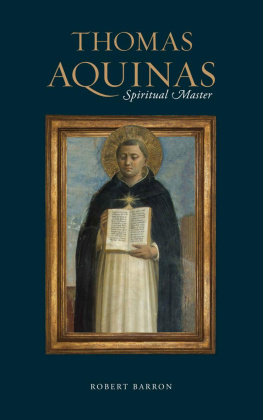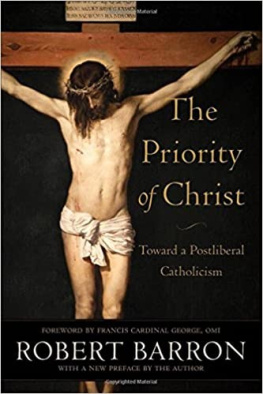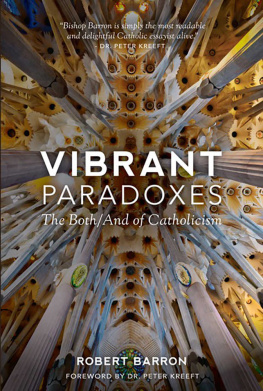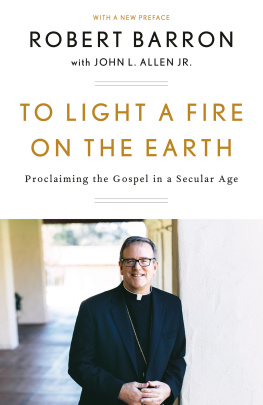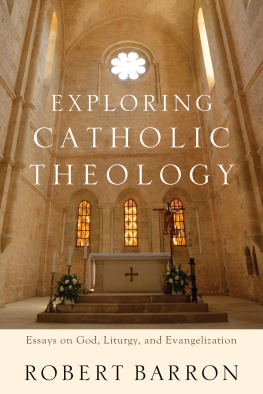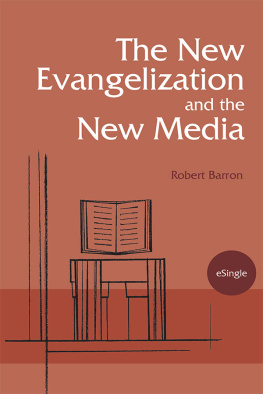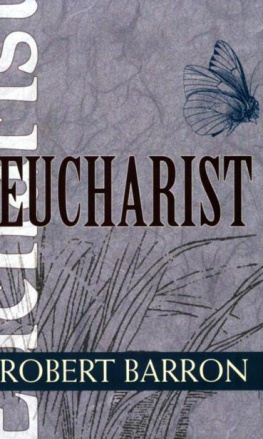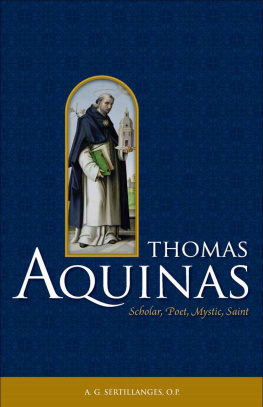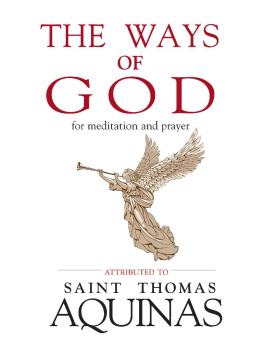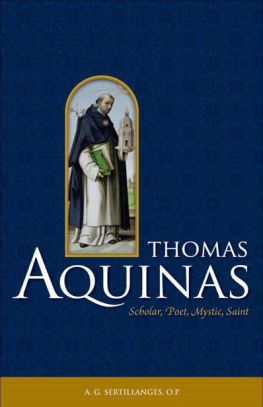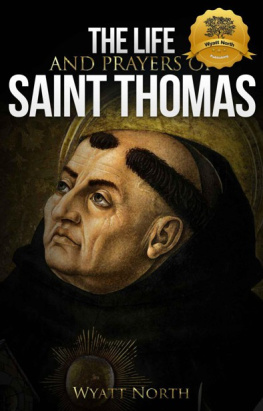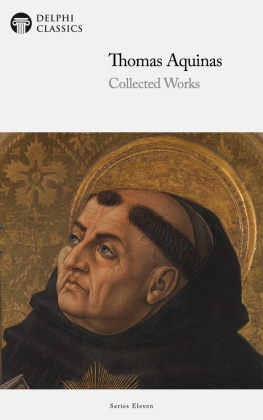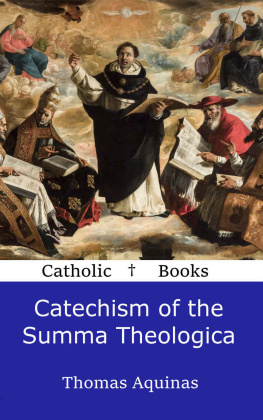Robert Barron - Thomas Aquinas: Spiritual Master
Here you can read online Robert Barron - Thomas Aquinas: Spiritual Master full text of the book (entire story) in english for free. Download pdf and epub, get meaning, cover and reviews about this ebook. year: 2022, publisher: Word on Fire, genre: Religion. Description of the work, (preface) as well as reviews are available. Best literature library LitArk.com created for fans of good reading and offers a wide selection of genres:
Romance novel
Science fiction
Adventure
Detective
Science
History
Home and family
Prose
Art
Politics
Computer
Non-fiction
Religion
Business
Children
Humor
Choose a favorite category and find really read worthwhile books. Enjoy immersion in the world of imagination, feel the emotions of the characters or learn something new for yourself, make an fascinating discovery.
- Book:Thomas Aquinas: Spiritual Master
- Author:
- Publisher:Word on Fire
- Genre:
- Year:2022
- Rating:3 / 5
- Favourites:Add to favourites
- Your mark:
- 60
- 1
- 2
- 3
- 4
- 5
Thomas Aquinas: Spiritual Master: summary, description and annotation
We offer to read an annotation, description, summary or preface (depends on what the author of the book "Thomas Aquinas: Spiritual Master" wrote himself). If you haven't found the necessary information about the book — write in the comments, we will try to find it.
Thomas Aquinas: Spiritual Master — read online for free the complete book (whole text) full work
Below is the text of the book, divided by pages. System saving the place of the last page read, allows you to conveniently read the book "Thomas Aquinas: Spiritual Master" online for free, without having to search again every time where you left off. Put a bookmark, and you can go to the page where you finished reading at any time.
Font size:
Interval:
Bookmark:
Praise for Thomas Aquinas
Robert Barron has a genius for identifying and articulating the human sources for our intellectual inquiry, and here that of Thomas Aquinas, and how his rich talents were transformed by a vibrant life of faith. Anyone introduced to Thomas in a way that missed his mind and heart will find here a fresh appreciation of his teaching as well as his inner life.
David Burrell , CSC , Theodore M. Hesburgh Professor Emeritus in Philosophy and Theology, University of Notre Dame
Bishop Barron does a beautiful job of making the writings of Aquinas come alive for today.
The Catechists Connection
Barron leads the reader beyond the technical theological language to the spiritual experience underpinning Thomas writing.
Review for Religious
Spirituality with spine.... Barrons solid and accessible study is itself a fine example of what he admires in his master.
Michael Downey , America
A valuable and successful attempt to represent Aquinas in a refreshing and original manner as one of the Christian traditions great spiritual masters.
Theological Studies
Winner of the Catholic Book Award for Spirituality


Published by Word on Fire Academic, an imprint of
Word on Fire, Park Ridge, IL 60068
2022 by Word on Fire Catholic Ministries
Printed in the United States of America
All rights reserved
Cover design, typesetting, and interior art direction
by Cassie Bielak, Marlene Burrell, and Rozann Lee
Except where otherwise indicated, all translations of the works of Thomas Aquinas in this book are from the Latin/English edition of the works of St. Thomas Aquinas published by the Aquinas Institute in collaboration with Emmaus Academic in print and at https://aquinas.cc/ .
Used by permission.
Excerpt from the English translation of the Catechism of the Catholic Church for use in the United States of America copyright 1994, United States Catholic Conference, Inc.Libreria Editrice Vaticana. Used by permission. English translation of the Catechism of the Catholic Church : Modifications from the Editio Typica copyright 1997, United States Conference of Catholic BishopsLibreria Editrice Vaticana.
Except where otherwise indicated, Scripture quotations are from the New Revised Standard Version Bible: Catholic Edition (copyright 1989, 1993), used by permission of the National Council of the Churches of Christ in the United States of America. All rights reserved worldwide.
No part of this book may be used or reproduced in any manner whatsoever without written permission, except in the case of brief quotations in critical articles or reviews. For more information, contact Word on Fire, PO Box 170, Des Plaines, IL 60016
or email contact@wordonfire.org.
First edition published 1996 by Crossroad Publishing Company
Second edition 2022
25 24 23 22 1 2 3 4
ISBN: 978-1-943243-79-2
Library of Congress Control Number: 2020925983
To Fr. Michel Corbin, SJ,
who first taught me to read Thomas Aquinas
as a spiritual master.
Contents
ACKNOWLEDGMENTS
There are many people whose influence and inspiration contributed to the writing of this book. I would mention first the Dominican Fathers of Fenwick High School in Oak Park, Illinois, who introduced me to the life and writings of Thomas Aquinas when I was a teenager. I would also acknowledge the impact of the numerous Thomists at whose feet I have studied over the years: Robert Sokolowski, John Wippel, and Thomas Prufer of the Catholic University of America in Washington, DC; David Burrell of the University of Notre Dame; Charles Meyer of Mundelein Seminary; and Michel Corbin of the Institut Catholique de Paris. Finally, I would like to thank two of my colleagues at Mundelein Seminary, Lawrence Hennessey and Raymond Webb, who in different ways pushed, pulled, and cajoled me into writing a better book.

INTRODUCTION
T homas Aquinas contribution to the Church and to Western culture in general has been so great that it is exceedingly difficult even to approach him, much less to understand him completely. He was a philosopher, scientist, mystic, theologian, scriptural commentator, and, in all things, a saint. For me, that last title is at the same time the most overlooked and the most illuminating. When one interprets Thomas merely as a rationalist philosopher or theologian, one misses the burning heart of everything he wrote. Aquinas was a saint deeply in love with Jesus Christ, and the image of Christ pervades the entire edifice that is his philosophical, theological, and scriptural work. Above all, Thomas Aquinas was a consummate spiritual master, holding up the icon of the Word made flesh and inviting others into its transformative power.
Toward the end of his life, after having struggled to compose a text on the Eucharist, Thomas, in an act of spiritual bravado not in keeping with his quiet nature, hurled his book at the foot of the crucifix, inviting Christ himself to pass judgment. According to the well-known account of this episode, a voice came from the statue of the crucified Jesus announcing that Thomas had written well concerning the sacrament and offering him a reward in recompense for his labors: What would you have? the voice asked. Non nisi te, Domine (nothing but you, Lord), responded the saint. It is my conviction that this mystical conversation between servant and Master is a sort of interpretive key to the whole of Aquinas life and thought: he wanted nothing more than Christ, nothing other than Christ, nothing less than Christ. He strove to walk in the path of discipleship and, in all of his writings, to show that path to others.
Now, I realize that my reader might, at this point, be wearing a puzzled frown. For many, Thomas Aquinaswhose writings are dry, recondite, often impenetrableseems an unlikely candidate for the title of spiritual guide. His highly philosophical and abstract style appears to be diametrically opposed to the more earthy, affective, and personal approach of such recognized spiritual writers as, say, Meister Eckhart or John of the Cross. However, it is fascinating to note that both Eckhart and John of the Cross are profoundly marked by the theology of Aquinas. The former sat in Aquinas chair of theology at the University of Paris and drank deeply from the wells of Thomas wisdom. And John of the Cross mystical poetry is built on the structure of Aquinas theology.
One of the most significant blocks to appreciating Thomas as a spiritual master is simply the fact that we do not share some of his basic assumptions about the role and purpose of theology. Many commentatorsincluding the Protestant Paul Tillich and the Catholic Hans Urs von Balthasarhave remarked that a great and problematic shift occurred around the year 1300. At that time, theology came to be seen as a formal university discipline and was distinguished from what we might today call spirituality. The most prominent mystics, poets, and spiritual guides of the postmedieval period tended not to be theologians; rather, they stayed away from the centers of scientific thought, preferring, in some sense, to go underground.
But prior to 1300that is, from the earliest centuries of the Church up until the time of Thomas Aquinasthere was no significant split between theology (talk about God) and spirituality. Many of the significant spiritual masters of the patristic periodOrigen, Augustine, Pseudo-Dionysius, Ambrosewere what we would call theologians. All of these figures were interested, finally, in the transformation, conversion, and salvation of human beings. Their theology was not abstract speculation for its own sake; on the contrary, it was a sort of spiritual direction, an attempt to draw people into the imitation of Jesus Christ. It is interesting to note that neither Origen nor Augustine nor Jerome was writing for tenure or to impress an academic audience. Instead, they were writing, first and foremost, as pastors, passionately interested in the salvation of souls. Even the most challenging, philosophically oriented texts in the Fathersand there are plenty of themare meant not simply to illumine the mind but to open up the heart. It seems to me that if one had asked St. Augustine to distinguish between his theological writings and his spiritual writings, the saint would have been at a loss.
Next pageFont size:
Interval:
Bookmark:
Similar books «Thomas Aquinas: Spiritual Master»
Look at similar books to Thomas Aquinas: Spiritual Master. We have selected literature similar in name and meaning in the hope of providing readers with more options to find new, interesting, not yet read works.
Discussion, reviews of the book Thomas Aquinas: Spiritual Master and just readers' own opinions. Leave your comments, write what you think about the work, its meaning or the main characters. Specify what exactly you liked and what you didn't like, and why you think so.

